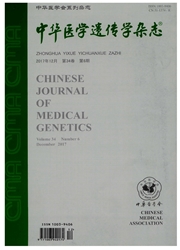

 中文摘要:
中文摘要:
目的探讨过氧化物酶体增殖因子激活受体a(peroxisomeproliferators—activatedreceptora,PPARa)蛋白在胶质瘤中的表达及其对胶质瘤细胞生长的影响。方法应用实时荧光定量PCR法检测PPARα mRNA在各级别胶质瘤组织中的表达水平;四甲基偶氮唑盐微量酶反应比色法和流式细胞技术检测予PPARα激动剂后胶质瘤细胞的增殖、凋亡和周期的改变;应用荧光分子探针,2’,7'-二氯二氢荧光素双乙酸盐法进行胶质瘤细胞内活性氧检测;Western印迹法检测AKT信号通路和PPARα下游功能蛋白的变化。结果胶质瘤组织中PPARα的表达随着胶质瘤级别的升高而降低,增加其蛋白活性后细胞内活性氧积聚增多,并引起AKT和CyclinD1蛋白表达下降;U87胶质瘤细胞生长受到抑制,细胞生长阻滞在G,期且凋亡增加。结论PPARα在胶质瘤中低表达;增强其蛋白活性可以造成细胞内活性氧积聚,并能影响AKT信号通路,抑制功能蛋白CyclinD1的表达,进而调控胶质瘤细胞的生长。
 英文摘要:
英文摘要:
Objective To study the expression of peroxisome proliferators-activated receptor a (PPARα) in human glioma tissue and its influence on tumor growth. Methods Expression of PPARα mRNA in glioma tissue was determined by real-time reverse transcription polymerase chain reaction (RT- PCR). Subsequently, MTT (3-(4, 5)-dimethylthiahiazo (-z-y1)-3, 5-di- phenytetrazoliumromide) assay, flow cytometry, reactive oxygen species assay kit and Western blotting were used to assay U87 cells with agonist activity of PPARa. Results The data demonstrated that the expression of PPARα in glioma was low and negatively correlated with its pathological grade. Activation of PPARα suppresses tumor cell proliferation, delays the cell cycle at G1 phrase, and induces apoptosis and accumulation of reactive oxygen species (ROS) in U87 cells. Conclusion The expression of PPARα mRNA in human glioma was low. PPARα protein plays a critical role in the progression of glioma via the PPARα signal pathway.
 同期刊论文项目
同期刊论文项目
 同项目期刊论文
同项目期刊论文
 期刊信息
期刊信息
